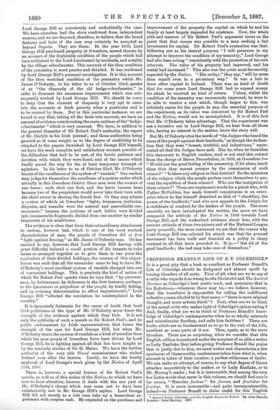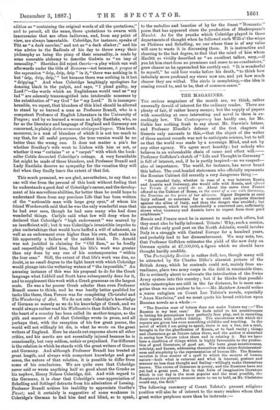PROFESSOR BRANDL'S LIFE OF S. T. COLERIDGE.* Ir is a
great pity that a book so excellent as Professor Brandl's Life of Coleridge should be disfigured and almost spoilt by teasing blunders of all sorts. First of all, what are we to say of a critic who regards it as wrong to cite Christabel and The Ancient Mariner as Coleridge's beat poetic work, and maintains that in his Reflections,—whatever these may be,—we believe, however, that the translator is responsible for calling the indifferent reflective poems alluded to by that name,—" there is more original thought, and more artistic finish" ? Next, what are we to think of the moral critic who makes light of Coleridge's opium.eating ? And, finally, what are we to think of Professor Brandl's know- ledge of Coleridge's contemporaries when he so wholly misreads and misestimates Southey, and calls him faithless ? These are faults which are so fundamental as to go to the root of the Life, excellent as some parts of it are. Then, again, as to the mere blunders. These are so surprising, when we consider that this English edition is produced under the auspices of so able a writer as Lady Eastlake, that before giving Professor Brandl the praise that is justly due to him, we must notice and characterise a few specimens of blameworthy carelessness taken from What is, when account is taken of their number, a perfect wilderness of faults. We can make no attempt, of course, to say what degree of blame attaches respectively to the author, or to Lady Eastlake, or to Mr. Murray's reader ; but it is inexcusable that among the very few Latin words that occur in this volume, we should find cereile for versus, "Hercules furious" for furens, and fruaatur for fruatur. It is more inexcusable—and quite incomprehensible, indeed—in Professor Brandl to claim credit for this English • Samuel Taylor Coleridge, and the English Romantic Behest. By Alois Brandi. London : John Murray. law. This much premised, we are glad, nevertheless, to say that no one will rise from the perusal of this book without feeling that he understands a good deal of Coleridge's career, and the develop- ment of his marvellous abilities, far better than he could hope to understand them from any previous Life that has been written of the "noticeable man with large grey eyes," of whom his friend Wordsworth said that he was the only wonderful man that he had ever seen, though he had seen many who had done wonderful things. Carlyle said what few will deny when he declared that Coleridge's "high endowment" was marred by an insufficient will ; bat it was Coleridge's irresistible impulse to plan undertakings that would have baffled a will of adamant, as well as an endowment even higher than his own, that made his life apparently a failure of the saddest kind. Dr. Arnold was not justified in claiming for "Old Sam," as he fondly and respectfully called him, that his life's work was greater than any done by any one of his contemporaries "within the four seas." Still, the extent of that life's work was due, no doubt, in no small degree to the light heart with which Coleridge would plunge into the weltering waters of "the impossible." An amusing instance of this was his proposal to do for the Greek language what Liddell and Scott have subsequently done for it, and to supplement this work with a Greek grammar on the largest scale. He was a far poorer Greek scholar than even Professor Brandi seems to think, and he was hardly better qualified for tasks like these, than Person was for completing Christahel and The Wandering of Abel. We do not rate Coleridge's knowledge of German so meanly as we do his knowledge of Greek, and we would always rather read his Wallenatein than Schiller's. But as the heart of a country has been called its mother-tougue, so the pith and marrow of all that Coleridge wrote in prose, and all perhaps that, with the exception of his few great poems, the world will not willingly let die, is what he wrote on the great writers of England. Here he stands out supreme above all other critics, and his merits are not essentially injared because he is occasionally, but very seldom, unfair or prejudiced. Far different is the relation in which he stands with the great writers of Greece and Germany. And although Professor Brandt has treated at great length, and always with competent knowledge and good sense, the nature of that relation, it is possible to differ from some of his conclusions. We are quite sure that Coleridge never said or wrote anything half so good about the Greeks as his nephew, Henry Nelson Coleridge, did. And with regard to the Germans, it is clear that Coleridge's over-appreciation of &shelling and Schlegel detracts from his admiration of Leasing. Professor Brandi notices his inability to appreciate Goethe's Faust; and it certainly is suggestive of some weakness in Coleridge's German to find him deaf and blind, so to speak, edition as "containing the original words of all the quotations," and to permit, all the same, those quotations to swarm with inaccuracies that are often ludicrous, and, from any point of view, are always lamentable. Coleridge, for instance, speaks of Pitt as "a dark scowler," and not as "a dark clinker ;" and his wise advice to the Radicals of his day to throw away their pHlosophy as being the pimp of their sensuality, is made by some execrable alchemy to describe Godwin as "an imp of sensuality." Sheridan did reject Osorio—a play which ran well afterwards under the title of Remorse—not because, a propos of the expression "drip, drip, drip" in it," there was nothing in it but 'drip, drip, drip,'" but because there was nothing in it but "dripping." And when Coleridge laughingly apologises for donning black in the pulpit, and says, "I plead guilty, my Lord !"—the words which an Englishman would read as "my Ind " are solemnly transmogrified into intolerable nonsense by the substitution of " my God" for "my Lord." It is incompre- hensible, we repeat, that blunders of this kind should be allowed to stand by so learned a man as Professor Brandi, who is a competent Professor of English Literature in the University of Prague ; and by so learned a woman as Lady Eastlake, who, no far as the literature and language of England and Germany are concerned, is plainly doctasermones utriusguelingwo. This book, moreover, is a nest of blunders of which it is not too much to say that, for all useful purposes, the true version would be no better than the wrong one. It does not matter a pin's fee whether Southey's wife went to Lisbon with him or not, or whether it was " curtains" or a "carpet" with which the book- seller Cottle decorated Coleridge's cottage. A very formidable list might be made of these blunders, and Professor Brandi and Lady Eastlake deserve no sympathy for the vexation they will feel when they finally learn the extent of that list. to the melodies and beauties of by far the finest "llomantic " poem that has appeared since the production of Shakespeare's Hamlet. As for the pranks which Coleridge played in these departments of thought when he followed such Will-o'-the-wisps as Plotinus and Schelling, no one whose time is of any value will care to waste it in discussing them. It is instructive and cheering to the last degree, to find that the mind of him whom Haditt so vividly described as "an excellent talker, very,—if youlet him start from no premisses and come to no conclusions," grew clearer as he approached his earthly end. "it is wonderful to myself," he said four weeks before his death, "to think bow infinitely more profound my views now are, and yet how much clearer they are withal. The circle is completing,—the idea is coming round to, and to be, that of common-sense."










































 Previous page
Previous page